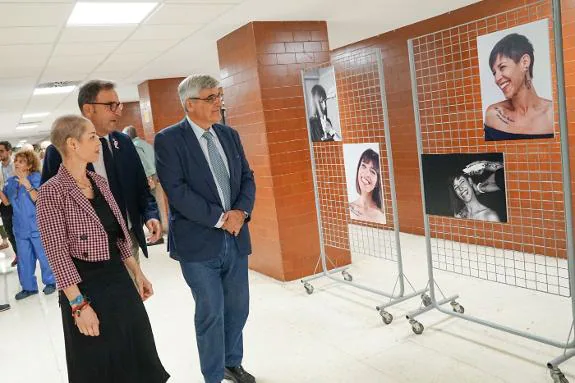

Sections
Highlight

Ángel Escalera
Friday, 18 October 2019, 15:35
Compartir
Early diagnosis and more effective treatments mean that nearly 90 per cent of patients survive breast cancer and are alive five years after it was detected.
In Malaga province there are between 800 and 900 new cases of breast cancer every year, and it is most common in women, says the head of the Oncology units at the Regional (formerly Carlos Haya) and Clínico hospitals, Emilio Alba, who is also a professor of Oncology at Malaga university. The cure rate for women with breast cancer at these hospitals is 87 per cent. Tomorrow, Saturday, is International Day Against Breast Cancer.
Dr Alba says the increased survival time is because tumours are being detected earlier and this is reflected in a better prognosis. Also, the treatments are now more effective and curative.
One of the challenges oncologists face is to try to increase survival through identifying the cases with the worst prognosis so those patients live longer, and to achieve the same good results but with less toxic and aggressive treatments.
Dr Alba says there is conservative surgery which retains the breast and avoids having to remove the axillary lymph nodes from under the arm; the new radiotherapy techniques, which are much more precise; and the use of genomic platforms to determine which women will need chemotherapy and when it is not needed. It is also important to improve the psychological support for patients and their families at the hospitals. In these two major hospitals in Malaga, psychological assistance for people with cancer is provided by volunteers from associations. Emilio Alba says there needs to be a psycho-oncology structure in the health service.
This specialist, the head of Oncology for the two biggest hospitals in Malaga, says the types of breast cancer treatments in which the greatest advances are being made are the hormonal type (cyclin-dependent kinase inhibitors) and the anti-HER2 treatment. Genomic platforms have been another important step forward. They do not cure more patients, but mean that patients who do not need chemotherapy are not given it.
At present, many researchers are working on techniques for early diagnosis of breast cancer which do not involve image technology. Dr Alba says that for a tumour to be detected through mammography it needs to be between 0.5 and one centimetre in size. As a system to detect tumours at a very early stage and when they are very small, there are research projects to identify changes before the tumour becomes evident from a radiological point of view. For this, they use the liquid biopsy (an analysis carried out on a sample of non-solid biological tissue, principally blood).
This week, a conference took place at the Maternal Infantil hospital called 'Let's talk about breast cancer', at which several experts explained the way this illness is being tackled through medical oncology, surgery, radiotherapeutic oncology and nursing care.
Beforehand, when the day started, the inauguration took place of an exhibition of photographs showing the whole process of hair loss in a patient with breast cancer, María Castro. The photos were taken by Ana Montaño. The title of the exhibition, which can be seen on the first floor of the Materno, is 'Por ti, por mi, por todas' (For you, for me, for every woman).
Both the inauguration of the exhibition and the conference were attended by Carlos Bautista, who is the regional government's provincial Health delegate, and the manager of the Regional Hospital, Víctor Baena.
Publicidad
Publicidad
Publicidad
Publicidad
Reporta un error en esta noticia
Necesitas ser suscriptor para poder votar.